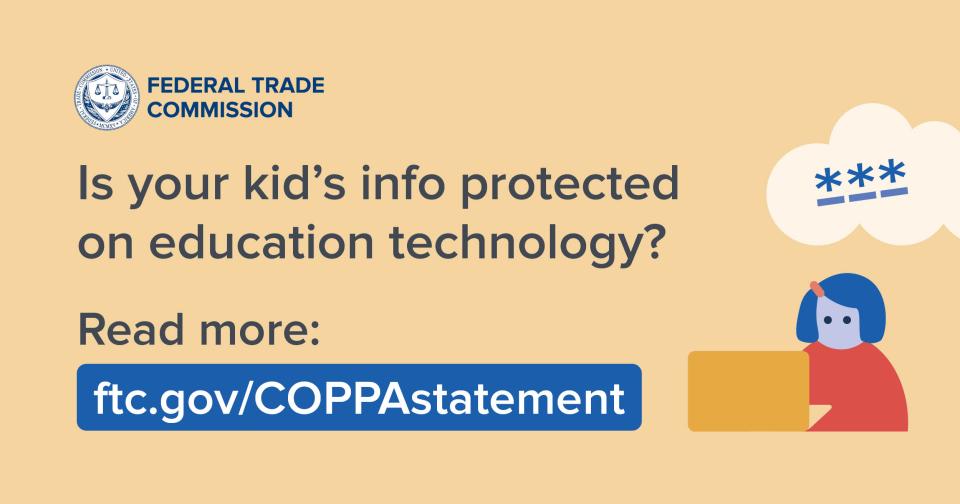Whether in class or at home, kids are probably using technology to do their schoolwork. But have you ever wondered what information that technology is gathering from your kid? The FTC has, and today issued a policy statement that put ed tech on notice: Kids shouldn’t have to give up their privacy rights to do their schoolwork or go to class remotely. In other words, ed tech companies: You can’t require parents and schools to agree to the comprehensive surveillance of children for kids to use those learning tools.
You might have heard of the Children’s Online Privacy Protection Act – also called COPPA. It’s at the center of the FTC’s efforts to protect kids’ privacy in the digital world. This law, enforced by the FTC, says that any site or service (think apps) that COPPA covers has to get a parent’s (or in some cases, a school’s) OK before it collects personal information from your child under 13. COPPA also protects kids’ privacy in other ways, like limiting how long companies can keep your child’s personal information and requiring that they properly safeguard the information. When a company breaks the rules, the FTC can sue.
With the pandemic-inspired explosion of ed tech, the FTC wants to make clear that ed tech companies offering online services directed to kids under 13 must follow the law, including by properly safeguarding your child’s personal information and, where a company relies on the school to provide consent, using kids’ information only for school-related purposes, not for things like marketing.
So, check out the Policy Statement itself for the details. But parents, here’s the message that industry is getting: The FTC is watching, ever more closely, what kid info you collect, how you use it, for how long you keep it, and how you protect it.
To keep up with the latest FTC actions, as well as the top frauds and scams, sign up for FTC Consumer Alerts: ftc.gov/consumeralerts.


I am resubmitting my former comment after correction for typographical errors.
I have an important concern about privacy rights of minor children, family data, school purchased surveillance tools (i.e., Gaggle), and school-sponsored use of social media platforms. My child’s school (which has 1:1 macbook use & distribution) allows teachers to choose & expect (aka, require) students to participate in a proliferation of social media platforms as school-student-family communications. Additionally, our school district utilizes surveillance tools like Gaggle to collate, surveil, and capture student communication and assignment data. This social media use includes communication platforms such as Remind and School Status, as well as popular social media platforms like Facebook, Twitter, Instagram, What’s App, and Discord. As a parent, I find this deeply troubling.
How can we create federal policy that truncates and formalizes the selection and use of appropriate platforms for formal home-school communication? In addition, what protections can we put in place, through federal legislation, that limits and erases upon high school graduation, data that is captured by for-profit companies like Gaggle, etc. that surveil children? The collation and collection of individual, student-level cumulative data by these companies could have lasting negative consequences on academic progression and matriculation into higher education. This is because as students move from grade to grade some of this accumulated data follows them and can easily be used against the child in a biased and censorial way. With regards to public district-level and school-level selection and use of social media platforms, the same platform that hosts racist violence, i.e., Discord, should not be a platform for formal teacher-student communication.
I have raised this issue with administrators in my school district multiple times who continue to tell me that school sites utilize “site-based decision making systems,” and that administrators need to provide faculty a variety of opportunities to communicate. I completely disagree. I believe that what we need to be doing is having the moral courage to protect our children and and teach them how to utilize communications platforms in effective, civil, and beneficial ways. This would require a selective and systematic use of particular communicative tools or platforms, rather than a proliferation of many different communication tools that might require parents and students to download and use a variety of social media applications at the same.
As with surveillance technologies, especially those that are used to surveil student assignments and student-student embedded communication, like chats and comments in google documents, privacy issues are a key part of appropriate use and selection of social media. Various social media platforms and communications platforms have variable privacy policies. Some companies have begun to reconsider the negative effects on teen mental health, whereas others have elided their own data indicating potential for harm (i.e., Instagram), and still others have failed to meet even minimal privacy disclosures (i.e. Locket, LiveIn) The size of my child’s “digital footprint” should be under my control as a parent. It should not be under the control of the teacher, principal, school district or for-profit companies that enter into contracts with school districts to either surveil students or serve as communication platforms.
I have looked for this information but can not locate anything reputable. The online education technology law as it applies to children under 13 years of age appears to be extremely important and needed. What information about children and/or parents was being collected prior to this announcement? Thank you